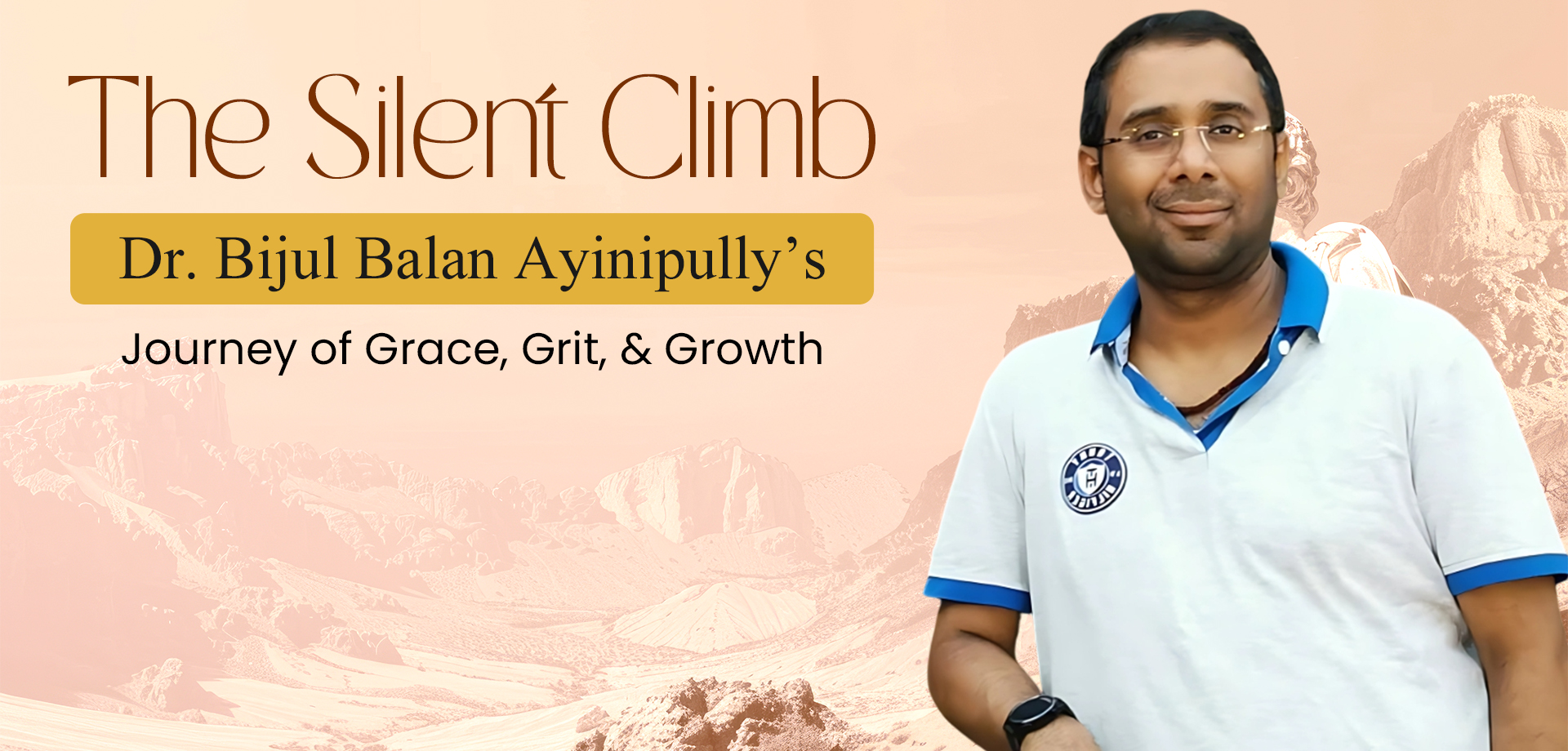
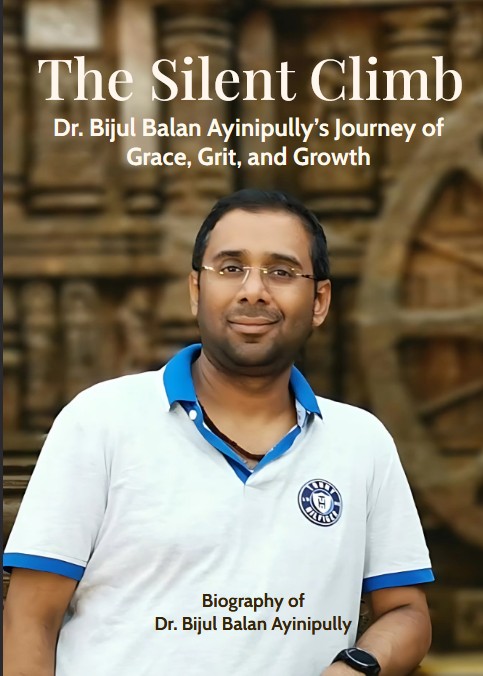
“BELIEVE IN YOURSELF. You are braver than you think, more talented than you know, and capable of more than you IMAGINE.”
INTRODUCTION
To understand Dr. Bijul Balan Ayinipully is to witness the extraordinary power of resilience. His life from a grocery shop in Abu Dhabi to the boardrooms of a multinational company is a testament to what happens when determination meets opportunity, and when faith outlasts failure.
Born in Kerala but shaped by the UAE, Dr. Bijul’s story mirrors the meteoric rise of Abu Dhabi itself. As a child, while his peers played after school, he was learning business fundamentals at his father’s grocery store—negotiating with suppliers, managing inventory, and understanding that trust was the most valuable currency. These weren’t just chores; they were the foundation of a financial mindset that would later define his career.
After earning top marks in his accounting exams, Dr. Bijul entered the corporate world with a simple promise at his first job interview.
“Give me three months. If I fail, let me go.”
He didn’t fail. Instead, he rose rapidly, correcting accounting tests for new hires and catching the attention of company leadership. Yet his path was far from smooth. Despite his contributions, he faced workplace differentiation, watching his peers advance while his career stagnated.
The true test came when a business investment in India collapsed, leaving him drowning in debt—14 maxed-out credit cards and a personal loan, a failed marriage, and days when even meals were uncertain. This was the rock bottom. But Dr. Bijul did something remarkable: he rebuilt. Through martial arts discipline, spiritual practices like Kriya Yoga, and sheer perseverance, he cleared every debt and reclaimed his life. Miracles, as he calls them, began appearing— unexpected loans approved, strangers offering help, and a renewed sense of purpose.
Today, Dr. Bijul stands as a senior finance leader Managing a MNC company, a PhD candidate researching blockchain in trade finance, and, most importantly, a devoted father and husband. His story isn’t just about professional success; it’s about the courage to start over, the wisdom to grow through pain, and the humility to credit both hard work and divine guidance.
As you read this biography, you won’t just find a career timeline. You’ll discover a playbook for resilience—proven not in theory, but in the life of a man who lost everything and still dared to dream bigger.
Phase 1 : Roots in the Sand: A Childhood in Transition
The oak fought the wind and was broken, the willow bent when it must and survived.” — Robert Jordan
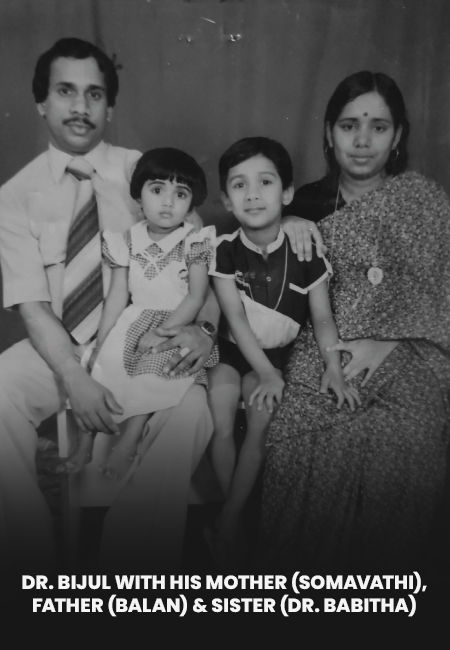
The desert city of Abu Dhabi is a place of paradox—once a barren landscape of sand and stillness, it has transformed into a global metropolis. For Dr. Bijul Balan Ayinipully, this evolution mirrored his own growth. Raised in the UAE from the tender age of one, his earliest memories are not of lush greenery or monsoon rains, but of sandstorms, small shops, and a father who worked hard to provide stability in a place that was still defining itself.
Born in Kerala, India, Dr. Bijul’s life in the Gulf began when his mother brought him to join his father, who had already laid roots in Abu Dhabi. While most children might recall playgrounds and toys, Dr. Bijul recalls the inside of a modest food shop, the feel of money being counted at a cash register, the scent of dry goods stacked on steel shelves. His father and brother had started a grocery business back in 1967 and continued by his father, one of the few sources of provisions in the region at the time—and young Dr. Bijul became a part of that legacy from the beginning.
Though he was still in primary school, Dr. Bijul’s real education often began after the school bell rang. While his friends played football or went out biking, he headed to the family shop to lend a hand. There was no resentment in this responsibility; rather, it became an incubator for maturity and real-world learning. Under his father’s watchful eye, he absorbed more than just the tasks of stocking shelves or tallying sales—he learned values. He learned how to be fair, how to treat customers with respect, and how to negotiate with stubborn suppliers. He saw firsthand the consequences of integrity, of choosing good quality over cheap shortcuts, of giving people more than what they expect.
This early immersion into business sharpened his mind, and when it came time for school, he approached it with the same seriousness.
In kindergarten, he was given a double promotion because of his performance an early signal of the intelligence and initiative that would shape his life. But not everything came easily. Hindi, a compulsory subject in his CBSE curriculum, became a dreaded obstacle. While Arabic posed little challenge limited to alphabets and basics—Hindi brought with it a flood of poems and compositions he found difficult to manage. When the chance came in ninth grade to switch to French, he took it without hesitation.
Phase 2
Foundations Forged-Early
Lessons, Family Business, &
the Seeds of Leadership
“Before you are a leader, success is all about growing yourself. When you become a leader, success is all about growing others.” — Jack Welch
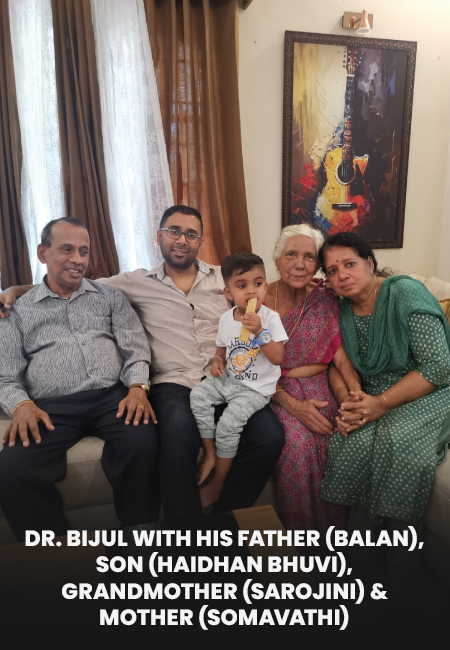
Every journey of resilience begins with roots—family, early challenges, and the first taste of responsibility. For Dr. Bijul Balan Ayinipully, the foundation of his character and career was laid in the vibrant, evolving city of Abu Dhabi, where he arrived as a one-year-old from Kerala, India. Growing up in a land transforming from desert to metropolis, Dr. Bijul witnessed firsthand the power of vision, adaptability, and hard work.
His earliest education was not just in classrooms, but in the aisles of his family’s grocery shop, established in 1967. From a young age, he helped manage accounts, stock, and customer relations, learning the practical pillars of business—people, money, resources, and decision-making. “Business is in my blood,” he often says, recalling how his father and uncles, all entrepreneurs, inspired him to value honesty, transparency, and service above all.
School life in Abu Dhabi was a blend of opportunity and challenge. Dr. Bijul was a “mediocre student” by his own admission, but he quickly learned to adapt, receiving a double promotion in kindergarten and navigating the demands of CBSE education, including the struggle with Hindi and Arabic. He chose commerce over medicine or engineering, setting himself apart from his siblings—both doctors—and charting his own path in accounting and business.
His practical education continued in the family shop, where he introduced creative strategies to compete with larger supermarkets: lowering prices on essentials, negotiating with suppliers for advertising space, and incentivizing workers. “I learned to make decisions at crossroads, to act quickly and calmly even in critical times,” he reflects. These lessons would become invaluable in his later corporate roles.
After completing his B.Com and MBA from Madurai Kamaraj University’s Abu Dhabi campus, Dr. Bijul’s professional journey began with humble roles—catalog distribution at IKEA, internal auditing at NMC Group, and survey supervision at AC Nielsen. Each job, no matter how small, was approached with diligence and a desire to learn. He kept a notebook of every instruction, determined never to ask the same question twice—a habit that built his reputation for reliability and thoroughness.
His first major break came at Mid East Data Systems LLC (MDS) in 2004, where he joined as a junior accountant. Despite his youth, his practical experience from the family business set him apart. He quickly earned the trust of his superiors, taking on more tasks and even correcting accounting test papers for new recruits. His dedication was recognized with a special award and a promotion to Assistant Finance Manager in 2010.
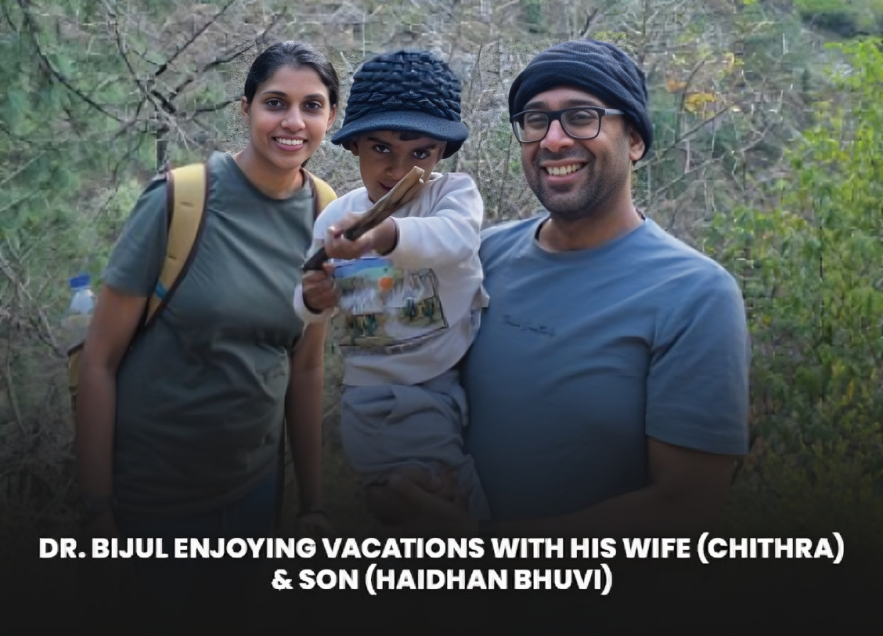
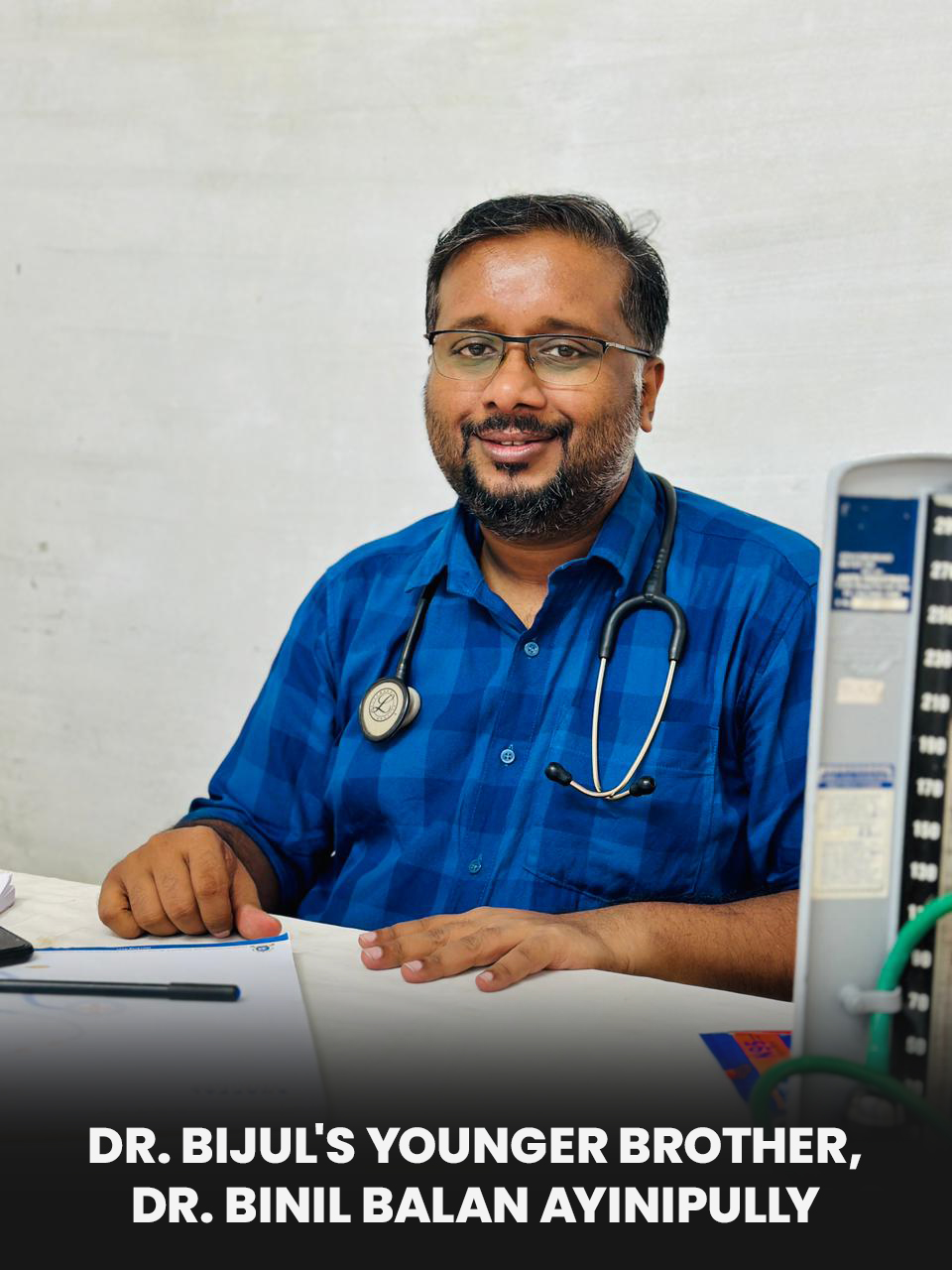
Phase 3 : The Climb: , Grit, and Professional Breakthroughs
“Success is not final, failure is not fatal: it is the courage to continue that counts.” — Winston Churchill
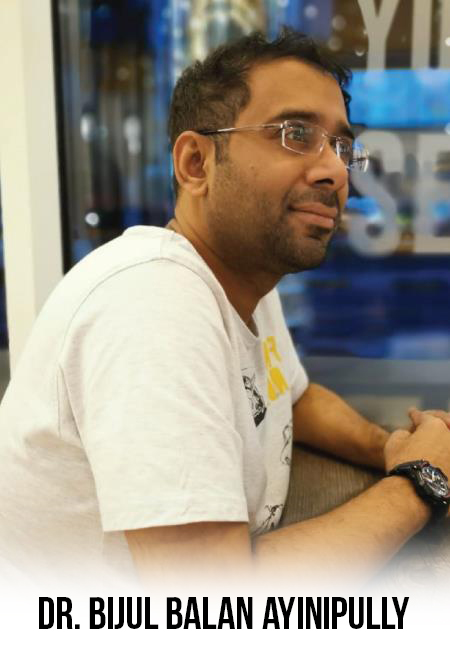
Every career has its pivotal chapters—those periods where the trajectory either stalls or soars. For Dr. Bijul Balan Ayinipully, the years following his return to Mid East Data Systems LLC (MDS) in 2011 marked a critical phase in his professional ascent. But the path was far from smooth. It demanded not only capability, but patience, resilience, and a thick skin to withstand the politics and inequities that often linger in the corners of corporate life.
After a six-and-a-half-year stint with MDS, Dr. Bijul made the difficult decision to leave the company in 2010. Despite his stellar performance and growing responsibilities, promotions and salary adjustments were not forthcoming. It was a bitter pill—watching colleagues with similar or even lesser experience move ahead while he remained overlooked. There were layers to it: workplace bias, and a systemic preference for certain regional professionals. For an Indian expatriate like Dr. Bijul, the ceiling felt low, and it had stopped rising.
Seeking a reset, he took a leap of faith and explored opportunities abroad, including a move to the United States. But as life would have it, the transition did not yield the breakthroughs he hoped for. Returning briefly to India, he accepted a role with Al Mansoori Specialized Engineering, a respected oilfield services company in Abu Dhabi. His time there, though short, allowed him to sharpen his financial skills in a new industry.
Meanwhile, back at MDS, things were falling apart in his absence. The company had underestimated the complexity of the systems and processes Dr. Bijul had put in place. No replacement could replicate the precision or reliability he had brought to the treasury and finance operations. Within months, senior management reached out and requested his return.
When he rejoined MDS in 2011, the terms were different. He was given better pay, broader responsibilities, and more visibility. But even then, growth remained hard-earned. Despite being instrumental in managing operations tied to a high turnover and supporting global transactions simultaneously, Dr. Bijul found himself navigating a professional environment that did not always reward based on merit alone.
In his role, he oversaw trade finance, forex management, corporate banking relations, and project-based insurance coverage. He became the go-to person for handling complex instruments like Letters of Credit (LCs), bank guarantees, and insurance declarations for marine and land shipments. His reach extended beyond finance—he interacted with legal advisors, liaised with project teams, and maintained direct contact with company leadership, including the CEO and chairman.